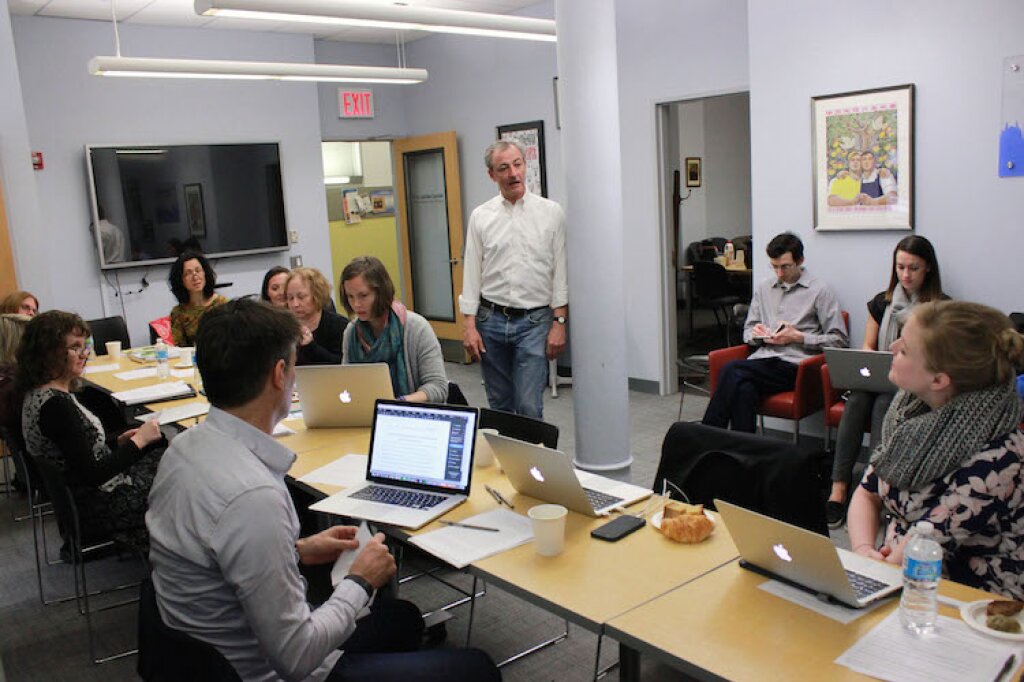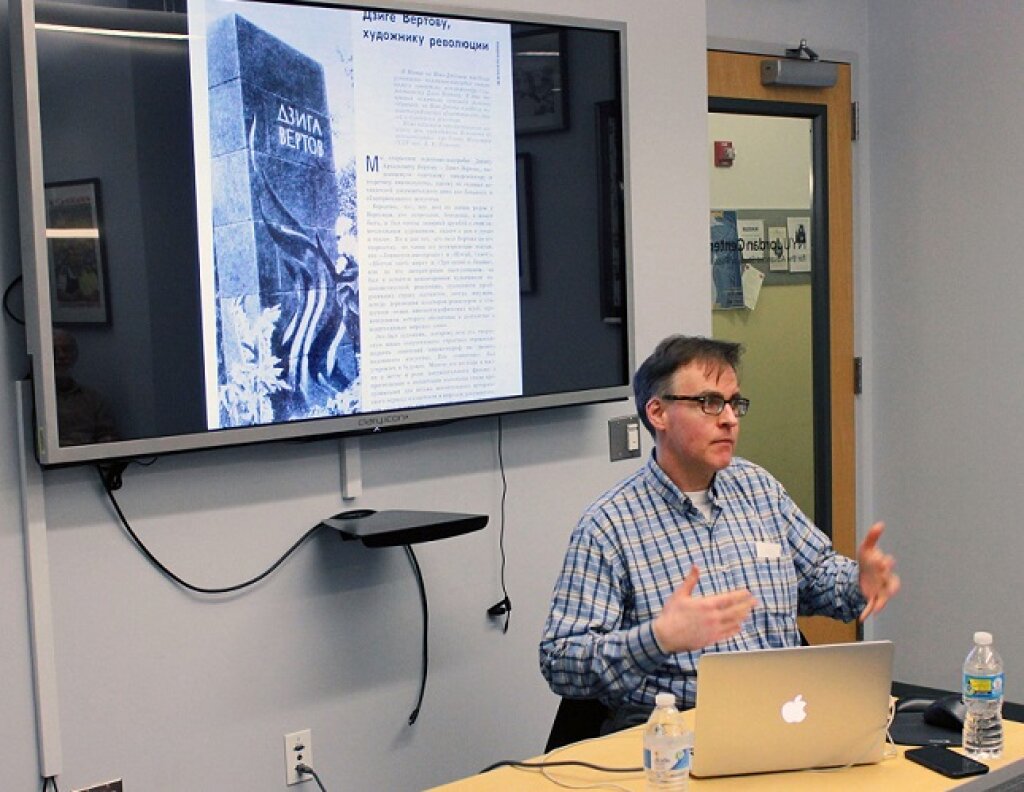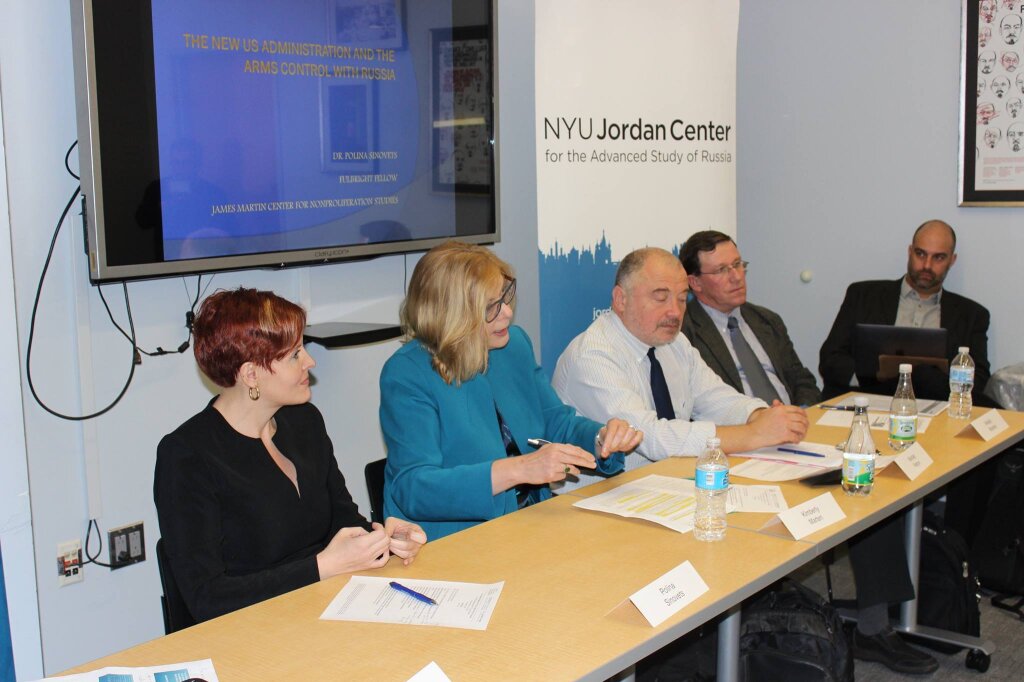On April 7, 2017, the Jordan Center for the Advanced Study of Russia held a workshop, Borders of Biopolitics: Population and Power in Modern Russia. The event was the second in a joint series organized and co-sponsored by the Jordan Center and the School of Slavonic and East European Studies (SSEES) Fringe Centre at University College London. Yanni Kotsonis, Professor of History at NYU, chaired this session of the workshop, and Boris Groys, Global Distinguished Professor of Russian and Slavic Studies, delivered the keynote address.
The conference, a collaboration between Kotsonis and Philippa Hetherington, a Lecturer in Modern Eurasian History at UCL SSEES, aimed to discuss and challenge the discourse of “biopolitics,” a term and a framework that refers to the production of state legitimacy through the use of the human body, and not just territory, as a crucial site of control. “We wanted to take biopolitics as a theme—as less of a prescriptive framework, but rather as an open one—to see whether people found it useful,” Kotsonis said. Pointing to the use of biopolitics in Russian studies, Hetherington mentioned that “the Russian field has talked a lot about population politics in the last 10 years, but not in the framework of biopolitics.” Like its sister event in London last October, Hetherington said that the main topic animating the workshop was the question of “what work biopolitics [is] doing as a heuristic in the Russian field, in an attempt to draw on theoretical language developed not necessarily for Russia.”
The first panel, “Siberia/Exile/Margins,” examined multiple efforts of the Russian and Soviet state to control prisoners in the far corners of the country. Abby Schrader, Professor of History at Franklin & Marshall College, spoke on “Disorderly Bodies in the Borderlands: Gender, Sex, Ethnicity, and the Problem of Settling Siberia.” In her talk, Schrader mapped various negotiations of power and authority in Siberia, both in the labor camps and settlements in the region, where she emphasized the importance of paying attention to issues of agency, in terms of ethnicity and race. Following, Golfo Alexopolous, Professor of History at the University of South Florida, presented on “The Gulag: Biopolitics and Necropolitics.” A corollary to Foucault’s biopolitics, “necropolitics” is the postcolonial political theorist Achille Mbembe’s explanation for the ultimate biopower—the authority to dictate who may live and who may die. In the gulag system, “[p]olitics in the name of life often perverted into its opposite,” Alexopolous said, arguing that control over the human body in the gulag could not be wholly explained by biopolitics. Finally, Daniel Beer, Professor of History at the Royal Holloway, University of London, gave a talk on “The Siberian Exile System and the Biopolitics of Penal Colonization in Late Imperial Russia.” Beer asserted that while the Russian empire possessed modern European ideas in their approach to population management and criminal justice, the study of penal colonization in late imperial Russia exposes that the state employed an “extremely hands off and weakly administered” strategy and faced various administrative and logistical challenges in their management of prisoners. In response to the three presentations, the panel’s discussant, Anne Lounsbery, the Russian and Slavic Studies Department Chair at New York University, was “reminded again as a literary scholar of the incredibly productive disconnect between representation and reality.” While the Russian empire was striving to exert control, she said, “efforts to bring this very messy reality into agreement with a truly fantastic vision” did not always pan out.
The second panel, “Regulation, Discipline, Normality,” drew together three presentations that discussed the gulf between modernity, ideals, and everyday reality in the Soviet Union and contemporary Russia. Fran Bernstein, Associate Professor of History at Drew University, served as discussant. First to present was Maria Cristina Galmarini-Kabala, Associate Professor of History at James Madison University, who spoke on “‘Mentally Retarded’ Children, the Myth of Defectology, and the Ideological Functions of Biopolitics in Soviet Socialism.” In her talk, Galmarini-Kabala argued that “defectology”—the Soviet treatment for children with learning disabilities that was supposed to normalize ‘abnormal’ children—was a myth and used that as a jumping off point to explore the ideological dimensions of Soviet biopolitics. Next, Kateryna Ruban, a Ph.D. student of History at New York University, spoke on “Female Body, Male Expertise, and the Birth of the New State: Performing and Debating Abortion in the Late Imperial and Early Soviet Russia.” Using the context of abortion, Ruban discussed the contradictions and inconsistencies of what we call “Soviet modernity” today. Lastly, Jennifer Suchland, Associate Professor of Women’s Sexuality and Gender Studies at Ohio State University, outlined some ideas from her paper, “Claiming ‘Whiteness,’ Rebuking Queerness: Russian Political Homophobia as Symptom of Subaltern Empire.” Suchland scrutinized Russian heteronationalism, which “rests on the biopolitical power of the state to protect the people.” Neither unique nor distinct from that of the West, Russian heteronationalism is nevertheless different in its practical forms. For example, the racialization or “migrantization” of ethnic groups like Chechens facilitates the specification of “Russian” as European. But at the same time, Europe, “soiled by gay marriages and multiculturalism,” is used to refract a racial identity in the Russian context, Suchland said.
For the final panel of the conference, “Bodies Reimagined,” Philippa Hetherington presented on “Territorializing Russian Biopolitics: Prostitution and the Production of Imperial Space in the Early Twentieth Century.” Stemming from a 1908 survey that that Ministry of the Interior commissioned about prostitution in the Russian empire, Hetherington’s talk focused on the government’s attempt to standardize and create a legal framework for the practice, using the data “as an experiment in thinking through the relationship between bureaucratic imagination of how an empire should be—how biopolitical governance should take place—and [...] what is happening on the ground.” Responding to the presentation, the discussant, Stefanos Geroulanos, Associate Professor of History at New York University, questioned new ways in which data from the ministry’s survey could be used in consideration of broader categories. “To what degree does prostitution fit into a broader racialized anxiety in the Far East?” he asked.
As the conference came to an end, Hetherington and Kotsonis inquired as to whether the workshop proved successful in exploring the utility of the term “biopolitics.” Participants also shared their thoughts for future discussions on the subject. Fran Bernstein of Drew University posed a few questions: “Do we say ‘Foucauldian biopolitics’ when we really mean agency? Do we need bodies or materiality to talk about biopolitics? Can we talk about biopolitics without there being experts?” she asked.



